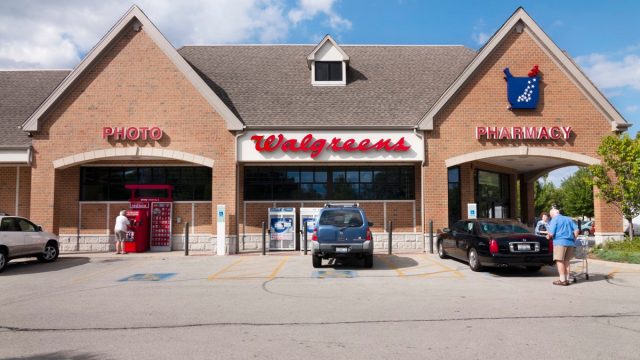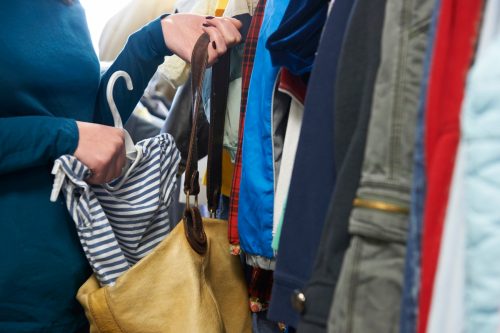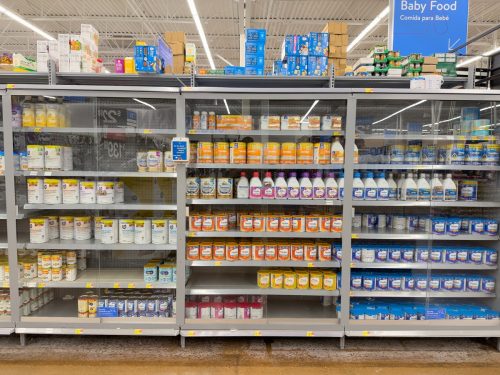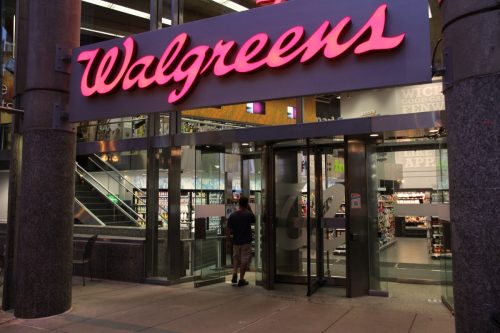Walgreens Store Bans Purses and Bags to Prevent Shoplifting—Will Others Follow?

Theft has been a concern for retailers from time immemorial, but in recent years, there’s been a notable uptick in shoplifting. Drugstores like Walgreens and CVS, and big-box stores like Walmart, have ramped up security measures to try to keep thieves away. As it turns out, locking up products may not be the only tool in their arsenal. One Walgreens store has now decided to stop shoppers from bringing in bags and purses at night as a new anti-theft measure. Read on to learn more about this radical ban, and whether more Walgreens will follow suit.
READ THIS NEXT: Walmart Slammed for New Shopping Features in Stores and Online.
Retail theft has been on the rise.

Thieves have been targeting retailers in what many claim are large-scale organized retail crime (ORC) schemes. The National Retail Federation (NRF) recently reported that ORC had increased by 26.5 percent in 2021, resulting in nearly $100 billion in losses for retailers that year. In fact, ORC has now become “a primary driver of retail shrink,” which is the loss of products from factors other than sales, according to the NRF.
“Unlike shoplifting events where an individual steals for personal consumption or use, there has been a dramatic increase across the nation in the number of large-scale, targeted thefts using methods of coordinated and planned attacks on retailers,” the NRF explained. “The losses drive up costs for retailers and, in turn, prices for consumers. Items stolen run the gamut from low-cost, easily fenced goods like razor blades and laundry detergent to designer clothing and high-end liquor.”
Stores have been implementing new anti-theft measures as a result.

In an effort to crack down on the shoplifting surge, retailers are taking action to deter thefts. CVS has been implementing time-delay safes in stores, while Home Depot has introduced new technology that prevents power tools from working if they’re stolen, according to Insider. For their part, both Walmart and Walgreens have been steadily locking up items.
A viral TikTok video recently showed that Walmart was locking up mascaras worth less than $10 on its shelves—even taking things a step further by having employees place the product in a locked box when a customer wants to buy it.
Walgreens, meanwhile, has been working to secure entire product categories, CEO Roz Brewer said during a Wall Street Journal summit in Dec. 2022. The drugstore had previously been locking down high-price items only, but changed tactics because shoplifters would “come in and take one elbow and swipe the whole counter,” according to Brewer.
Now, it seems that at least one Walgreens store has decided existing anti-theft measures are not enough.
RELATED: For more up-to-date information, sign up for our daily newsletter.
One Walgreens store is banning bags and purses.

A new shoplifting prevention method has been spotted at a Walgreens in Greensboro, North Carolina. The location on Cornwallis Drive has started restricting late-night shoppers from bringing certain things inside as of Jan. 31, the Rhino Times reported.
According to the local newspaper, customers are now greeted at night with a sign from the location’s management that reads, “Attention. We will NOT be able to allow ANY large purses or bags in the store at this time. Sorry for any inconveniences this may cause.”
And that’s not all. Once inside the Cornwallis Drive Walgreens, shoppers may notice another change. The Rhino Times reported that the store is also removing its shopping carts and hand-held baskets every night. A store employee told the newspaper that this is another prevention method implemented to prevent shoplifting at that location.
But why this Walgreens in particular? In Sept. 2021, a man dubbed the “Body Wash Bandit” entered the Cornwallis Drive location with a large tote bag and stuffed it full of personal hygiene products like body wash, according to the newspaper.
It’s unclear if other Walgreens locations will be following suit.

An employee at the Cornwallis Drive store told the Rhino Times that this new anti-theft measure may not be in place at other Walgreens locations in Greensboro. Other stores in the city are not open all night like the Cornwallis Drive store, which is open 24 hours daily, according to the Walgreens website.
Best Life reached out to Walgreens to find out if other locations will start banning shoppers from bringing large purses and bags inside at night, but has not yet heard back. Based on recent comments from the company, however, it seems perhaps unlikely that this will become a nationwide restriction.
In an earnings call on Jan. 5, Walgreens CFO James Kehoe indicated that the company might have taken its anti-shoplifting efforts too far. “We’ve put in incremental security in the stores in the first quarter,” Kehoe said. “Actually, probably we put in too much, and we might step back a little bit from that.”
In 2022, Walgreens said it was experiencing a nearly 50 percent increase in losses from retail theft compared to years prior. At the time, Kehoe said that Walgreens’ shrink rate was about 3.5 percent, with ORC playing a significant role.
But in the Jan. 5 earnings call, Kehoe said the shrink rate had fallen to around just 2.5 percent. “We’re quite happy with where we are … That’s well below the prior years level,” he noted. “Maybe we cried too much last year when we were hitting numbers that were 3.5 percent of sales.”